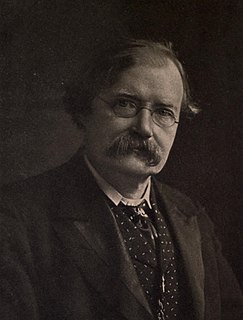A Quote by John Churton Collins
Envy and fear are the only passions to which no pleasure is attached.
Related Quotes
The word "jealousy" is often used as if it were synonymous with envy; but I think the distinction worth preserving. Jealousy is predominantly concerned with the fear of loss of something one possesses, envy with the wish to own something another possesses. Othello suffers from the fear that he has lost Desdemona's love. Iago suffers from envy of the position held by Cassio, to which he feels entitled.
Envy is the most universal passion. We only pride ourselves on the qualities we possess, or think we possess; but we envy the pretensions we have, and those which we have not, and do not even wish for. We envy the greatest qualities and every trifling advantage. We envy the most ridiculous appearance or affectation of superiority. We envy folly and conceit; nay, we go so far as to envy whatever confers distinction of notoriety, even vice and infamy.
Envy, envy eats them alive. If you had money, they’d envy you that. But since you don’t, they envy you for having such a good, bright, loving daughter. They envy you for just being a happy man. They envy you for not envying them. One of the greatest sorrows of human existence is that some people aren’t happy merely to be alive but find their happiness only in the misery of others.
What is required is the finding of that Immovable Point within one's self, which is not shaken by any of those tempests which the Buddhists call 'the eight karmic winds': 1-fear of pain, 2-desire for pleasure; 3-fear of loss; 4-desire for gain; 5-fear of blame, 6-desire for praise; 7-fear of disgrace; [and] 8-desire for fame.
What is freedom? It consists in two things: to know each his own limitations and accept them - that is the same thing as to know oneself, and accept oneself as one is, without fear, or envy, or distaste; and to recognise and accept the conditions under which one lives, also without fear or envy, or distaste. When you do this, you shall be free.
An immoderate fondness for dress, for pleasure, and for sway, are the passions of savages; the passions that occupy those uncivilized beings who have not yet extended the dominion of the mind, or even learned to think with the energy necessary to concatenate that abstract train of thought which produces principles.... that women from their education and the present state of civilized life, are in the same condition, cannotbe controverted.
It is difficult to say which is the greatest evil--to have too violent passions, or to be wholly devoid of them. Controlled with firmness, guided by discretion, and hallowed by the imagination, the passions are the vivifiers and quickeners of our being. Without passion there can be no energy of character. Indeed, the passions are like fire, useful in a thousand ways, and dangerous only in one--through their excess.
Envy, jealousy, ambition, any kind of greed are passions; love is an action, the practice of human power, which can be practiced only in freedom and never as a result of compulsion.
Love is an activity, not a passive affect; it is a "standing in," not a "falling for." In the most general way, the active character of love can be described by stating that love is primarily giving, not receiving.
I am constantly trying to communicate something incommunicable, to explain something inexplicable, to tell about something I only feel in my bones and which can only be experienced in those bones. Basically it is nothing other than this fear we have so often talked about, but fear spread to everything, fear of the greatest as of the smallest, fear, paralyzing fear of pronouncing a word, although this fear may not only be fear but also a longing for something greater than all that is fearful.
The urge to distribute wealth equally, and still more the belief that it can be brought about by political action, is the most dangerous of all popular emotions. It is the legitimation of envy, of all the deadly sins the one which a stable society based on consensus should fear the most. The monster state is a source of many evils; but it is, above all, an engine of envy.



































